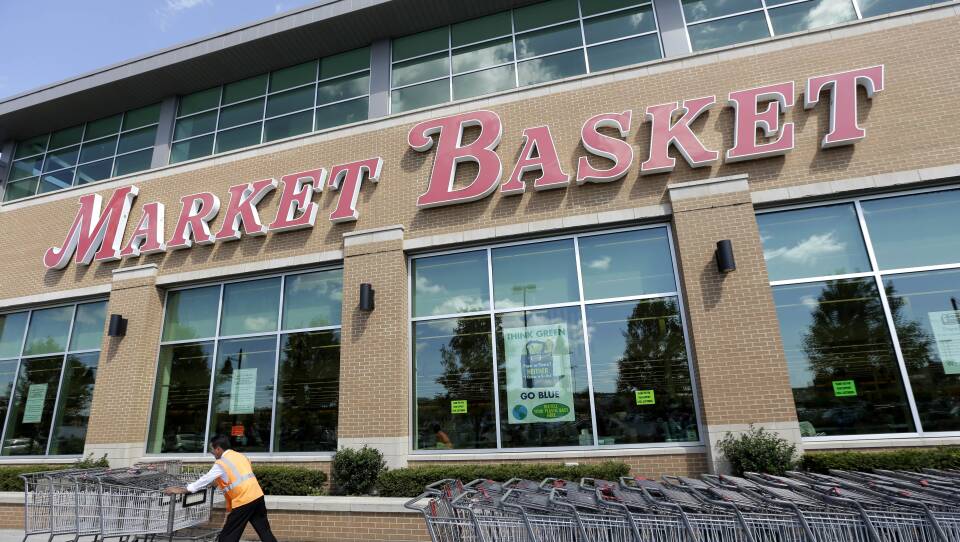This is a web edition of GBH Daily, a weekday newsletter bringing you local stories you can trust so you can stay informed without feeling overwhelmed.
☀️Sunny, clear, and hot, with highs approaching 90. Sunset is at 8:07 p.m.
Today’s story takes us deep into the deli aisle, the produce department, and the freezer section. But first: GBH’s Esteban Bustillos spent the weekend with Fenway Park concession stand workers, who were on strike for the three-game Red Sox-Dodgers series this weekend asking for higher pay and protections against self-checkout stands eliminating their jobs.
“The last proposal that they sent to us was cents increase. We’re looking for dollars. We’re not here for pennies; we’re here for dollars,” said worker Natalie Greening, picketing outside the park.
The strike officially ended at the end of last night’s game. Officials with the union, UNITE HERE Local 26, said they are continuing to negotiate with food service giant Aramark and may strike again if they can’t reach an agreement. We’ll keep you posted.
Four Things to Know
1. Gov. Maura Healey named the president of the state’s top hospital lobbying group to the board of the Massachusetts Health Policy Commission, a health care regulator. Massachusetts Health and Hospital Association President Steve Walsh, a former state representative, said he promised to recuse himself from matters concerning the hospitals and companies he represents.
But other people said they have concerns: “As a registered lobbyist for the industry, Steve Walsh’s appointment is a blatant conflict of interest,” said Eileen McAnneny, president of the Employer Coalition on Health. Jon Hurst, president of the Retailers Association of Massachusetts, said the appointment “just goes to show that, really, the political bias and priority is toward the industry.”
2. Since September close to 30,000 people have enrolled in the MBTA’s new discounted fare program for low-income riders, which lets people earning less than $31,300 (or $64,300 for families of four) buy one-way rides at half-price and monthly passes for $30.
Those trips account for between 3 and 4% of all rides on the system. MBTA officials had initially expected only about 29,000 people would enroll in the first year. The T got $45 million in state funds this year to cover the program’s costs.
3. This weekend marked the 35th anniversary of the Americans with Disabilities Act, the federal law that protects the civil rights of people with disabilities. Disability advocates say they’re proud of the anniversary, but also concerned about the future with cuts to Medicaid, medical research and programs that help disabled kids in schools.
“It’s … a little disappointing and bittersweet that for the 35th anniversary we’re in a place of resistance rather than celebration,” said Steven Schwartz, with the Center for Public Representation. “But that’s where we are, and I think people are equally determined to resist as they would be to celebrate.”
4. Musical satirist (and math professor) Tom Lehrer died in Cambridge at age 97 on Saturday. His total body of musical works wasn’t huge — roughly three dozen published works before he left songwriting to return to teaching math full time, according to the Associated Press — but they made a huge impact on the comedy songwriting genre.
“I used to laugh more. Now I get angry,” Lehrer said in a 1997 interview with NPR. “And it’s very hard to be satiric and — or to be funny, let’s say — and angry at the same time.”
Latest family feud at Market Basket has customers asking 'what to do?’
Most corporate feuds happen in boardrooms and in corner offices, with little attention from customers and the public. Then again, most corporations aren’t Market Basket.
Eleven years ago, current Market Basket CEO Arthur T. Demoulas and his cousin, Arthur S. Demoulas were competing for control of the grocery store chain. Some Market Basket customers took their business to other grocers in protest, with some even returning to their local Market Baskets to tape their Stop & Shop or Shaw’s receipts to the windows.
Now Arthur T., who won out a decade ago, has been on paid leave since May, suspended by the board over disagreements with family members and the board over who should succeed him. There are also larger questions of corporate culture. Last week, he said in a statement that board members who come from private equity or real estate don’t “understand this company’s culture,” which focuses on the well-being of workers and customers over shareholder profits.
So what does this mean for customers? Unlike a decade ago, when workers called for a boycott until Arthur T. was reinstated, there are no organized calls to action. Two executives fired last week stopped short of calling for one on GBH’s Boston Public Radio, saying it’s up to customers to make their own decisions.
Matilda Luisi, who lives in the North End, said she stocks up at the Chelsea location once a month because prices are lower and she loves the quality of meat and produce.
“I love Arthur T. I think he’s the best, I want to cook for him, I want to do anything I can to help him in his situation, and if he needs me for anything all he has to do, I’ll be here at Market Basket,” she told GBH’s Zoe Mathews.
So: would she boycott the stores until the family feud is over?
“I don’t want to talk about that. Don’t go there.”
If you want to catch up on the saga, you have not missed your chance. GBH’s Zoe Mathews has all the details on the current happenings and how they relate to 2014’s boycott here.






